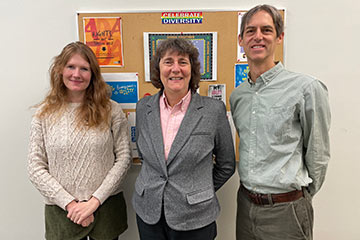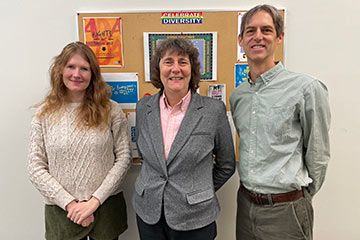November 7, 2023
SUNY Cortland is recognized as one of the top schools in the country for students with disabilities, ranking 42nd on the national list of disability-friendly colleges.
Cortland is one of only three New York state colleges recognized by Intelligent.com, a website that analyzes data on prospective college students.
The website notes that up to 20 percent of U.S. college students report having a disability, but the supports schools offer can vary widely. Ranking data is based on specific initiatives and programs to help students with physical and learning disabilities, each school’s costs, credits required to graduate, online and on-campus offerings, and accreditation status.
Sue Sprague, director of Cortland’s disability resource office, said her office’s goal is to improve the perceived accessibility of everyday life at the university, from on-campus housing and service animals to online learning and note-taking technology.
“We want to ensure that students with disabilities have equal access to education, programs and activity choices and are not discriminated against on campus,” Sprague said. “Our office staff wants to ensure that students with disabilities feel part of the SUNY Cortland community, that their differences are welcomed and respected, and that they receive assistance when needed.”
Tim Davis, associate professor in the Department of Physical Education and national chair of the Adapted Physical Education Education National Standards (APENS) program, said Sprague and her office have made a big difference at Cortland.
“She (Sprague) has been a great advocate for students with disabilities and giving them a voice,” Davis said.
A big part of that is student outreach, and Sprague’s office is inviting all staff, students and faculty to meetings scheduled for Tuesday, November 28th at 5pm and Friday, November 29th at noon in the Fireplace Lounge in the Corey Union.
“This year we plan to hold a series of focus groups to provide additional structure for eliciting information about how students and other community members perceive campus culture around disabilities, accessibility and interactions with the office,” said Assistant Director Katie McCulloch.
The Disability Resource Office will also be hiring for a new position to help students with neurodevelopmental disabilities with executive function strategies, such as time management, focus and planning, which Sprague said are important foundations for building decision-making and self-confidence.
Emily Helft, associate director of professional development at the Landmark College Research and Training Institute, will also speak to faculty on Tuesday, Jan. 16, and Wednesday, Jan. 17, about “The Hidden Connection: The Link Between Executive Function and Student Behavior and Success.”
Deputy Director Jeremy J. Heimerman said the progress comes at a time when increased funding for students with disabilities across the State University of New York system has led to a significant increase in students using his office.
“Accessibility and inclusion is the responsibility of the entire university, not just our office,” said Zee Heimerman. “This ranking is a testament to the great work people are doing across campus. I hope our office is doing a good job in welcoming students with disabilities, ensuring they have equal access to SUNY Cortland, and educating the campus about disabilities and accessibility. But it takes a caring community like we have at SUNY Cortland to create an accessible campus where students with disabilities feel a sense of belonging.”
———
Pictured above: From left, Katie McCulloch, Sue Sprague and Jeremy Zhe-Heimerman from the Disability Resources Office at SUNY Cortland.


